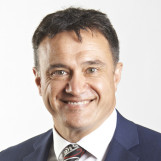
With a passion for improving people’s lives, Vaughan says he’s excited to be a part of transforming New Zealand’s vocational education and training system.
“What drives me is being able to make a positive difference. Over the last 20 years, I’ve held roles where that difference has been to ‘total wellbeing’ such as environmental, social and economic. Education underpins our wellbeing, individually and collectively; therefore, it underpins society.
Having the mandate to transform New Zealand’s education system is not only the chance to make a significant difference to our country’s total wellbeing, but it is also a once in a lifetime opportunity."

Vaughan Payne DCE Operations
“Hearing stories of people who, against all odds, turn their own lives, or the lives of others, around inspires me. Seeing people helping out in society, including for future generations, and the many volunteers supporting our communities - people getting together to do the greater good and for the benefit of all, is very motivating,” says Vaughan.
With a focus on total wellbeing and sustainability, Vaughan and his family live on a 10-acre block within the Waikato River catchment.
In the last six years, they have planted 70% of their property with more than 11,000 native trees to restore the wetlands and bring back native birds.
Vaughan is Eastern BOP Iwi Whakatohea (Mataatua) and Ngai Tai (Tainui) and was born and raised in his tribal area and town, Opotiki. He started his career in land surveying then moved into environmental planning following an enlightening experience in his early 20s.
“My heart was set on land surveying, then one day at work, what I saw changed my path. I found a discharge pipe into a river. Above the pipe the river was beautiful clear green, below the river was black all the way to the ocean. I was shocked, and that experience changed the way I viewed the world. It motivated me to take responsibility for changing that picture for our future. So, I then became a planner.”
Vaughan has worked in both the public and private sectors, including as CE of both Opotiki District and Waikato Regional Councils. He says one of the most memorable programmes was an investigation into lifting staff engagement. It was believed that lots of new positive initiatives would raise staff engagement, but the expected increase just wasn’t happening. When the initiative changed to measuring culture, great progress was made. Vaughan says, “Engagement is a symptom of culture and it was the latter we needed to focus on. A high correlation exists between leadership, culture and performance. As a result of our leadership programme and culture roadmap, we made great progress building a constructive culture. The organisation benefitted from higher performance and people were sharing better ‘work stories’. Good workplace culture benefits people professionally and personally and flows into the rest of their lives outside of work.”
In his first week at Te Pūkenga, Vaughan hit the ground running. He was in Wellington attending meetings, including the monthly Council meeting, then spent time in Te Pūkenga offices in Hamilton trying to make sense of it all! He says, “It was enjoyable, but I was like a possum in the headlights as this is a new sector for me. I have met so many great people who are so passionate about making a difference, I can’t wait for week two to meet some more! I know there’s a strong team within our head office and more broadly across the subsidiary network and we’ve got some big challenges, but ultimately, we are a people organisation. And it’s our people who will make transformation work for our learners.
Ko te manu e kai ana i te miro, nōna te ngahere. Ko te manu e kai ana i te mātauranga, nōnā te ao. The bird who feasts on the miro berry, theirs is the forest. The bird who feasts on knowledge, theirs is the world.”

